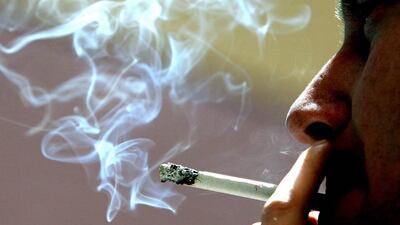ABU DHABI // Strict rules curbing the sale and advertisement of tobacco come into force on Tuesday.
The legislation makes it illegal to smoke in a vehicle when a child under 12 is present, forbids the sale of cigarettes to under-18s and bans tobacco advertising and promotion.
Advertisers who flout the rules could face fines of up to Dh1 million, while those breaking the underage smoking rule risk a fine of between Dh500 and Dh10,000.
Doctors, anti-tobacco experts, child safety campaigners and grocery stores have welcomed the move, but also said cooperation between government bodies was vital and a national awareness campaign would help.
“This regulation of tobacco will deter people from smoking and prevent people from second-hand smoke,” said Dr Wedad Al Maidoor, head of the tobacco control team at the Ministry of Health, which is responsible for enforcing the rules.
“The main goal is to create a new generation that will not want a lifestyle associated with tobacco.”
Smoking in houses of worship or educational institutions, such as universities and schools, is also banned, as is the sale of sweets that resemble tobacco products and selling tobacco from a vending machine.
Dr Taisser Atrak, head of paediatrics at Mafraq Hospital in Abu Dhabi, welcomed the measures to ban smoking in a vehicle when a child under 12 is present.
“This will make a major, major difference,” said Dr Atrak, a child safety campaigner.
“Even if a baby is born with good lungs, second-hand smoke can cause many illnesses. Inhaling tobacco in this way can even cause asthma.
“Especially here, in the UAE, because of the weather we close the windows, so the concentration of smoke is even worse. This will have a great effect on reducing respiratory illnesses among children.”
Dr Saicharan Bodi, a respiratory expert at Burjeel Hospital, said a worrying rise in allergies and wheezing among children – of which second-hand smoke is a contributory factor – could be stemmed thanks to the legislation.
“Making it more difficult for teenagers to get their hands on cigarettes is also very important,” Dr Bodi said. “About a quarter of all smokers had their first cigarette before the age of 18. The younger you start smoking, the more addicted you become.”
Smoking is also the single biggest risk factor for developing lung cancer, chronic obstructive pulmonary disease and cardiovascular disease, Dr Bodi said.
Other experts said the law would only be effective if everyone cooperates to enforce them.
A national awareness campaign would help, said Dr Hanan Ali Obaid, head of the Dubai Tobacco-Free Project.
“Now it is very important to implement the law. The law is there but it is not in the process of proper implementation,” she said.
Dr Obaid said Dubai’s Roads and Transport Authority, police, municipality and other organisations should work together to put the laws into effect.
Tobacco kills about six million people a year, according to the World Health Organisation. Of these, 600,000 are non-smokers who have been exposed to second-hand smoke.
Walid Ali, a manager at an Abu Dhabi baqala, said his shop already checked young people’s IDs before allowing them to buy cigarettes, although he did not know if other shops did the same.
“Too many young people are coming – 12, 13, 15,” said Mr Ali, 40, an Iranian.
At Fathima supermarket down the street, one worker, Binita Upreti, 25, said the shop did not sell to children younger than 18.
But she said this could create problems at the store, which is near a primary school.
“Sometimes the kids want to start a problem or make a fight when we don’t sell to them,” she said.
jbell@thenational.ae
lcarroll@thenational.ae

